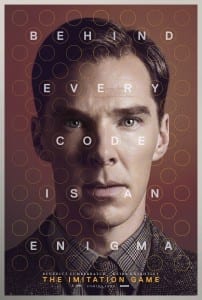The Imitation Game kicks butt

War, women, homosexuality, and nerdy brilliance. Prime.
Author: Alex Antoneshyn
Benedict Cumberbatch’s performance as Alan Turing in The Imitation Game is one you need to see. Not only is his portrayal of the British mathematician, cryptanalyst, and computer scientist hauntingly captivating, the story of Turing’s work to decipher Nazi code is one that deserves to be told. Alongside Keira Knightley, Allen Leech, Matthew Goode, and Charles Dance, Cumberbatch unveils one of the world’s biggest secrets.
The historical drama, whose screenplay was written by Graham Moore and directed by Morten Tyldum, is set in Manchester in the early 1950s and opens with Turing’s character under interrogation. He earns the attention of the authorities after a burglary, and during the interview his participation in World War II is demystified through a series of time lapses. As the story unfolds, viewers learn that Turing was instrumental in designing and building the machine that allowed the Allied forces to decipher Nazi messages. Despite the estimation that Turing’s invention – inspiration for today’s computers – shortened the war by two years and saved fourteen million lives, Cumberbatch’s character is charged with and placed on probation for gross indecency when his homosexuality is discovered.
If you decide to see The Imitation Game, prepare to be charmed by the socially awkward Turing. Cumberbatch’s interactions with both Turing’s team and co-star, Knightley, are simultaneously amusing and painful to watch. Likewise, while the dialogue is often humorous, amidst such levity is the seriousness of the pressure to prevent a possible Ally loss and intolerance in society for outcasts, whether that is the nerd, homosexual, or workingwoman. Fast moving and intricately woven, the storyline will leave you anxious about what will follow. As a cinematic experience, The Imitation Game lacks little.
As a historical testament, however, the film sacrifices accuracy and detail for the sake of drama. While a thorough explanation of the code-breaking machine’s mechanics would have required maybe more time than was available, The Imitation Game provides a less-than-rudimentary description of the mathematics behind it. This is where the filmmakers chose to substitute instead the social context and significance of Turing’s life – a decision, I believe, that makes the film all the more important. If you go into The Imitation Game with the opinion that Turing’s efforts during the war are his only significant contribution to today’s society, expect to be proven differently.
As well, The Imitation Game altered and exaggerated several facts regarding character relationships and the machine they built in the name of romanticism. For fear of ruining its end, I won’t tell you the specific inaccuracies, but be aware that although the movie is based on a true story, the use of “based” is a relative term.
Nonetheless, The Imitation Game remains one of the best movies you will see this year. A dedication to the men and women of World War II, specifically those who worked in Hut 8 breaking Enigma, The Imitation Game brings to light the brilliance and misfortune that was the life of Alan Turing.









